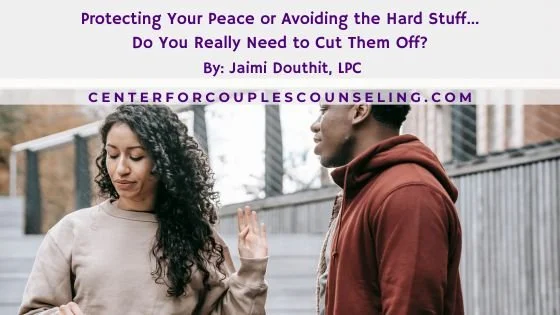Protecting Your Peace or Avoiding the Hard Stuff…Do You Really Need to Cut Them Off?
“Protecting my peace.” It’s the modern-day mic drop. We hear it everywhere… from TikTok clips to self-care quotes on pastel backgrounds. And yes, protecting your peace IS important. But sometimes what we call “protecting our peace” is actually just… avoiding discomfort Oops!
Let’s be honest, relationships are messy and hard. Whether it’s with your partner, your sister, or your best friend since high school, there are times when things feel heavy, confusing, or straight-up exhausting. And when that happens, the temptation to pull back, or completely cut off, can be strong. It feels cleaner, simpler, safer.
But here’s the catch: real peace doesn’t come from avoidance. It comes from clarity, boundaries, and courage.
The Myth of the Cut-Off as Self-Care
There’s a difference between protecting your peace and protecting your avoidance. One is rooted in growth and boundaries. The other is rooted in fear and discomfort.
Cutting someone off can feel empowering, especially if you’ve spent a lifetime putting other people’s needs above your own. And sometimes, yes, it is the healthiest choice. If someone repeatedly crosses your boundaries, manipulates, abuses or harms you, that’s not “the hard stuff,” that’s toxicity. In those cases, stepping back or walking away is self-respect, not avoidance.
But often, we use “protecting my peace” as a shortcut for “I don’t want to deal with this.” It’s a soothing little mantra that keeps us from facing our own part in the pattern. Because facing conflict… even healthy conflict… means vulnerability. It means sitting in discomfort. And that’s not fun, in fact, it can feel legitimately gross… even for the most self-aware among us.
Ask Yourself: What Am I Protecting?
Before you cut someone off or pull away, pause and ask:
What am I actually protecting? My well-being, or my comfort? Is this boundary or avoidance? Have I said what needs to be said? Or am I leaving because it feels easier than being honest?
Healthy relationships, romantic or otherwise, need repair moments. Conflict isn’t a sign that something’s broken; it’s a sign that something matters. The couples who thrive aren’t the ones who never fight; they’re the ones who learn to stay in the ring together, respectfully and with compassion.
Boundaries Aren’t Barriers
Protecting your peace doesn’t mean building emotional walls so high that no one can reach you. True boundaries are like doors… they can open and close as needed. They give you structure and connection.
If you find yourself saying, “I’m done,” but there’s a lingering ache underneath, that’s your cue to slow down and process. Sometimes the work isn’t about walking away; it’s about learning to show up differently and that can look a bunch of different ways. Maybe that means expressing your needs more clearly, asking for space without disappearing, or choosing therapy over silent resentment.
The Real Peace
Here’s the truth: Real peace doesn’t come from avoiding conflict, it comes from knowing you can handle it. It comes from trusting yourself to speak up, to listen, and to repair when things get messy. So before you cut someone off, check in with yourself. Protecting your peace might look less like shutting people out and more like showing up with honesty, boundaries, and heart.
Because peace built on avoidance is fragile. But peace built on courage? That’s the kind that lasts.
My name is Jaimi Douthit and I’m a Licensed Professional Counselor at the Center for Couples Counseling. I love working with couples and individuals who are ready and motivated to make changes in their lives and relationships, who can handle feedback and encouragement, and engage in using the tools I teach in therapy outside of the therapy room. At the Center for Couples Counseling, we specialize in couples therapy, infertility counseling, postpartum mood and anxiety disorders, self-care and burnout, and perfectionism. We help couples and individuals in the League City and Houston areas in person, and all residents of the State of Texas online. Call us at (832) 827-3288 to schedule a free phone consultation.
Begin Couples Therapy in League City, TX
We know relationships take a lot of hard work. But your relationship is important and deserves the effort. At Center for Couples Counseling we want to help you and your partner get back on the right track. To get started with in-person or online couples therapy follow these simple steps:
Meet with one of our skilled couples therapists
Begin to see positive changes in your relationship
Other Services Offered at Center for Couples Counseling
At the Center for Couples Counseling, we understand you or your relationship may be facing different challenges. To help you work on yourself and your relationship, our Texas practice offers individual therapy, infertility counseling, postpartum anxiety, and depression counseling, therapy for self-care and burnout, and therapy for perfectionism. For more about us check out our FAQs and blog!




